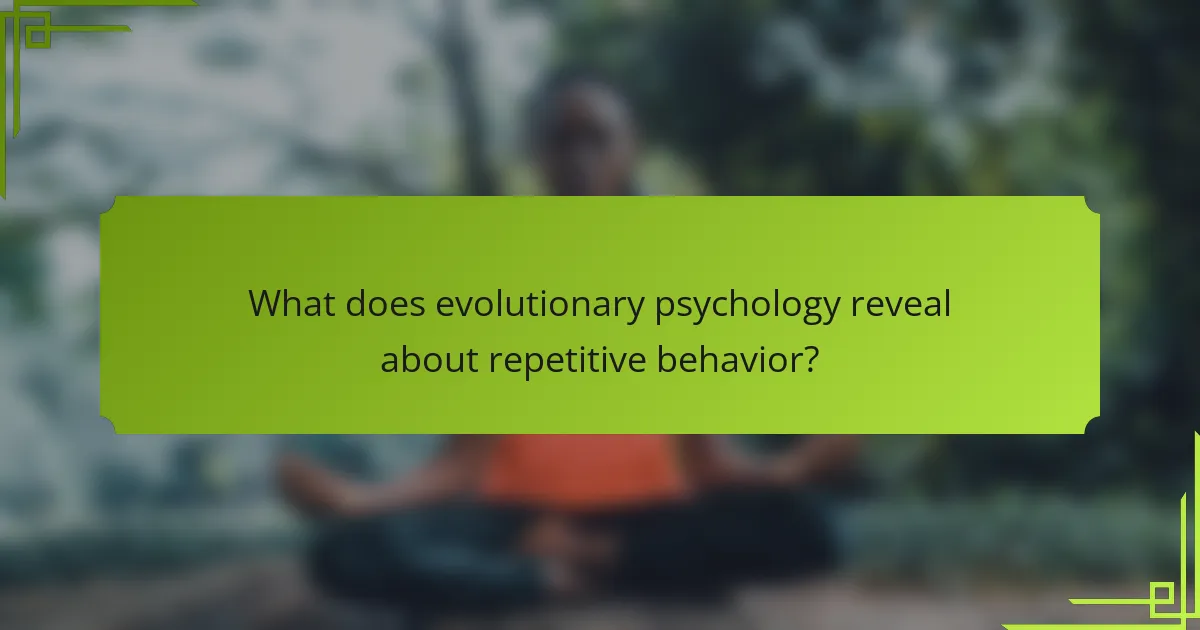Understanding why we often repeat behaviors despite negative outcomes is crucial for personal growth. Insights from evolutionary psychology reveal that these patterns stem from innate instincts and maladaptive responses. The article explores human adaptability, the role of social dynamics, and the impact of cognitive biases on behavior change. By recognizing these factors, individuals can devise effective strategies to break unproductive cycles and achieve better results.

What does evolutionary psychology reveal about repetitive behavior?
Repetitive behavior often stems from evolutionary psychology’s insights into human instincts and learning patterns. This discipline reveals that such behavior can be a maladaptive response, where individuals cling to familiar actions despite negative outcomes. Evolutionarily, this may have provided a sense of security or predictability in uncertain environments. Understanding this can help in recognizing the psychological traps that lead to unproductive cycles. Embracing change and adapting strategies are crucial for breaking these patterns and achieving different results.
How do evolutionary principles explain the tendency to repeat actions?
Evolutionary principles suggest that repeating actions stems from survival instincts. This tendency, known as behavioral reinforcement, emerges from the brain’s reward system, which reinforces actions that previously yielded positive outcomes. Evolutionarily, this behavior increases the likelihood of survival by encouraging repetition of successful strategies. For example, early humans repeated actions that led to food acquisition or safety, reinforcing those behaviors through positive reinforcement. Thus, when individuals continue to engage in the same actions despite varying results, it reflects an instinctual drive rooted in evolutionary psychology.
What are the psychological mechanisms behind expecting different outcomes?
Expecting different outcomes from the same actions stems from cognitive biases and evolutionary psychology. Individuals often rely on optimism bias, believing future attempts will yield success despite past failures. This mechanism can be traced to survival instincts where hope played a crucial role in persistence against adversity. Additionally, the concept of confirmation bias leads people to notice only evidence that supports their expectations, reinforcing the cycle. Understanding these psychological mechanisms reveals why change is often overlooked, emphasizing the need for adaptive thinking to break the pattern.
How do cognitive biases influence decision-making?
Cognitive biases significantly skew decision-making by distorting perception and judgment. These biases arise from evolutionary adaptations that prioritize quick, heuristic-based choices over thorough analysis. Confirmation bias, for instance, leads individuals to favor information that supports existing beliefs, often resulting in repeated mistakes. Anchoring bias causes reliance on initial information, limiting perspective and adaptability. Understanding these biases is crucial for improving decision-making processes and achieving better outcomes.
What role does reinforcement play in behavior patterns?
Reinforcement significantly shapes behavior patterns by influencing the likelihood of repeating actions. Positive reinforcement increases the probability of a behavior by offering a reward, while negative reinforcement strengthens behavior by removing an adverse stimulus. These mechanisms are crucial in evolutionary psychology, as they help organisms adapt to their environments by promoting beneficial behaviors. Understanding these dynamics reveals why individuals often persist in certain actions, even when outcomes are not favorable. This persistence can be explained by the reinforcement history associated with those behaviors, highlighting the complex interplay between reward systems and behavioral patterns.

What are the universal attributes of human behavior in evolutionary psychology?
The universal attributes of human behavior in evolutionary psychology include adaptability, sociality, and problem-solving. These traits evolved to enhance survival and reproductive success. Adaptability allows individuals to modify behaviors based on environmental changes. Sociality fosters cooperation and group dynamics, essential for resource sharing and protection. Problem-solving skills enable humans to navigate complex challenges, ensuring better outcomes in diverse situations.
How does survival instinct drive repetitive actions?
Survival instinct drives repetitive actions as a mechanism for adaptation and learning. This instinct compels individuals to engage in behaviors that have previously ensured survival, even when outcomes remain unchanged. Evolutionary psychology highlights that these repetitive actions can stem from cognitive biases, such as the illusion of control, where individuals believe their actions will yield different results despite evidence to the contrary. This phenomenon illustrates a unique attribute of human behavior: the tendency to cling to familiar strategies in uncertain environments, often leading to frustration and stagnation.
What common cognitive patterns emerge from evolutionary psychology?
Common cognitive patterns in evolutionary psychology include confirmation bias, loss aversion, and the optimism bias. These patterns stem from adaptive functions that enhance survival and reproduction. Confirmation bias leads individuals to favor information that supports existing beliefs, while loss aversion makes losses feel more significant than gains. The optimism bias encourages a positive outlook on future events, often influencing decision-making. Understanding these patterns can help individuals recognize repetitive behaviors and adjust their strategies for better outcomes.

What unique insights does evolutionary psychology provide on behavioral change?
Evolutionary psychology provides unique insights into behavioral change by highlighting innate instincts and adaptive behaviors. It explains that behaviors often persist due to evolutionary advantages, even when they yield negative outcomes. Understanding these patterns helps in devising effective strategies for change. For example, recognizing the role of social dynamics and environmental cues can enhance motivation and commitment to new behaviors. By addressing these evolutionary roots, interventions can be tailored to align with human nature, increasing their effectiveness.
How can understanding ancestral environments inform modern behavior?
Understanding ancestral environments can significantly shape modern behavior by revealing innate psychological patterns. Evolutionary psychology suggests that many behaviors stem from survival strategies developed in early human history. For instance, social hierarchies and resource allocation behaviors are often rooted in ancestral need for group cohesion and survival. Recognizing these patterns allows individuals to address maladaptive behaviors that arise from modern contexts, such as stress and competition. This insight can lead to more effective coping strategies and improved interpersonal relationships, aligning behaviors with evolutionary predispositions for better outcomes.
What are the unique challenges in breaking repetitive cycles?
Breaking repetitive cycles presents unique challenges due to ingrained habits and cognitive biases. These challenges include resistance to change, emotional attachment to familiar patterns, and limited awareness of alternative behaviors. Evolutionary psychology suggests that these cycles persist because they are often reinforced by past rewards, making it difficult to adopt new strategies. Additionally, social influences can create pressure to conform to established norms, further complicating the process of change. Understanding these psychological barriers is crucial for effectively breaking free from unproductive cycles.

What rare attributes influence our ability to change behavior?
Rare attributes that influence our ability to change behavior include cognitive biases, emotional triggers, and social influences. Cognitive biases, such as confirmation bias, can hinder the acceptance of new information. Emotional triggers, like fear or joy, significantly impact decision-making processes. Social influences, including peer pressure and cultural norms, shape behavior through external validation. Understanding these rare attributes can enhance strategies for effective behavioral change.
How do evolutionary mismatches affect decision-making?
Evolutionary mismatches can lead to irrational decision-making due to outdated instincts. These instincts, shaped by ancestral environments, often clash with modern contexts, causing cognitive biases. For instance, a preference for immediate rewards over long-term benefits can result from this mismatch. As a result, individuals may struggle to make optimal choices in today’s complex landscape. Understanding these mismatches is crucial for improving decision-making strategies.
What infrequent psychological traits can hinder personal growth?
Infrequent psychological traits that hinder personal growth include rigidity, fear of change, and lack of self-awareness. These traits prevent individuals from adapting and evolving, leading to repetitive behaviors and stagnation. For instance, rigidity in thinking can result in a refusal to consider alternative perspectives, while fear of change may cause avoidance of new opportunities. Lack of self-awareness limits the ability to recognize personal flaws and areas for improvement, ultimately stalling growth.

How can insights from evolutionary psychology be applied to personal development?
Insights from evolutionary psychology can enhance personal development by understanding behavioral patterns. Recognizing that many behaviors stem from ancestral survival strategies allows individuals to identify unproductive habits. For instance, the tendency to avoid discomfort is rooted in evolutionary survival, but it can hinder personal growth. By consciously challenging these instincts, one can adopt more adaptive behaviors. Additionally, understanding social dynamics from an evolutionary perspective can improve interpersonal relationships, fostering collaboration and empathy. Emphasizing the importance of adaptability can lead to more effective goal-setting and achievement.
What strategies can help break the cycle of repetitive behavior?
To break the cycle of repetitive behavior, individuals can adopt strategies such as self-reflection, setting clear goals, and seeking external feedback. Self-reflection allows for the identification of patterns and triggers, while clear goals provide direction for change. External feedback from trusted sources can offer new perspectives and accountability. These strategies align with insights from evolutionary psychology, which emphasizes the importance of adaptability and learning from past experiences.
What common mistakes should be avoided when seeking change?
To avoid common mistakes when seeking change, recognize that repeating the same actions will yield the same outcomes. This principle, rooted in evolutionary psychology, highlights the need for adaptive strategies.
First, resist the urge to maintain familiar routines. Sticking to old habits may provide comfort but limits growth. Second, set clear, measurable goals. Vague intentions lead to confusion and inaction. Third, seek diverse perspectives. Engaging with different viewpoints fosters innovative solutions. Lastly, be open to feedback. Constructive criticism is essential for identifying blind spots and refining approaches.
By understanding these principles, individuals can navigate change more effectively and achieve desired results.
What expert tips can enhance the effectiveness of behavioral change efforts?
To enhance the effectiveness of behavioral change efforts, apply insights from evolutionary psychology. Focus on understanding intrinsic motivations and social influences.
Utilize strategies such as setting achievable goals, leveraging social support, and emphasizing immediate rewards. These approaches align with human behavior patterns shaped by evolution.
For example, breaking down goals into smaller, manageable tasks can increase motivation and success rates. Additionally, creating environments that promote positive behaviors can foster lasting change.
By recognizing and addressing the underlying psychological factors, you can significantly improve the outcomes of behavioral change initiatives.
